EXCLUSIVE: Apple CEO Steve Jobs, former Apple CEO Michael Spindler as well as other high-profile company execs are named in the most recent investor lawsuit over stock option grant irregularities and may be forced to return the monies they made from grants received as part Apple's executive stock compensation plan, if the lawsuit is successful.
Details of the lawsuit, which were exclusively obtained by AppleInsider this week, reveal that the allegations extend to the highest management levels, including former Chief Financial Officer and current board member Fred Anderson, iPod chief Jon Rubinstein, former Chief Technology Office Avi Tevanian, current Vice President of Retail Operations Ron Johnson, and current Executive Vice President and Chief Operating Officer Tim Cook. It also names as defendants all members of Apple's current Board of Directors, with the exception of Former Vice President of the United States Albert Gore, Jr.
In total, the lawsuit alleges that 18 executives and directors manipulated the option grant dates of certain stock options to maximize their own profits from the company's stock compensation plan, violating Generally Accepted Accounting Principles as well as its own shareholder-approved stock plan. Upper management also, it claims, intentionally provided false documentation to the Securities and Exchange Commission. Similar allegations against executives in other companies have been raised by investor lawsuits and SEC investigations, according to the lawsuit.
Court documents obtained by AppleInsider reveal that the suit cites a recent analysis and investigation by The Wall Street Journal that describes similar stock option backdating practices by companies such as KLA Tencor, Comverse Technology, Vitesse Semiconductor, and Affiliated Computer Services.
The Apple investor lawsuit provides details on over a dozen stock option grant exercises by unspecified individuals in Apple's upper management from 1993 through 2001, claiming that the stock grant option dates were retroactively changed to provide the highest compensation for the company's executives.
Questionable Apple Stock Option Grants by Name
In an article dated March 18, 2006, the Journal claimed that similar and apparently "fortuitous" patterns of stock option grant strike prices at Vitesse were unlikely due to chance, but a result of backdating — a conclusion which the Journal supported by its own analysis, saying that the chances of such a pattern emerging was around one in 300 billion, or about twice as unlikely as winning a multi-state Powerball lottery.
The Apple investor suit claims that similar "extraordinarily remote" patterns are seen when looking at Apple's own financial records. "In a striking pattern that could not have been the result of chance, each and every one of the foregoing stock option grants was dated just after a sharp drop and just before a substantial rise in Apple's stock price," the suit reads.
It compares the stock prices of executive stock option grants between the years of 1993 and 2001, looking at the stock prices 10 days before and 10 days after each option grant date. The results are more than fortuitous, the suit claims. The data shows a remarkable pattern of all gains — between 1.5 percent and nearly 50 percent on the series of grants. None of the exercised option grants showed a loss within the first 10 days after each grant date, indicating that stock was always exercised before a peak in stock price.
"The odds that the pattern of the fortuitously-timed stock option grants exhibited by Apple is the result of chance are similar to, if not greater than, the one in several billion or more odds described by the The Wall Street Journal," the plaintiffs allege in their complaint. "The actual reason for the extraordinary pattern exhibited by Apple was that the Office Defendants' stock options were improperly backdated."
The lawsuit seeks to recover the "millions of dollars of damages" sustained by the company as a result of the backdating, the proceeds gained by the individual defendants who received the grants, the plaintiffs' legal fees and any further relief the Court deems proper.
Board is not impartial
The suit also alleges that Apple's current seven-member Board is unable to act as independent oversight committee for investigation and prosecution of alleged breaches of fiduciary duty. It contends that six of the seven board members — all except former United States Vice President Al Gore — are not "disinterested" parties, as many of them have participated in the backdating either as part of the company's Compensation Committee (Campbell, Drexler, Levinson, and York) or Audit Committee (Campbell, Levinson, and York) or are directly affected by the stock option grants (Jobs and Anderson), or have approved false documentation to the SEC (Anderson, Campbell, Drexler, Jobs, Levinson, and York).
On June 29th, less than 24 hours before the suit was filed, Apple issued a press release stating that an internal investigation had discovered irregularities related to the issuance of certain stock option grants made between 1997 and 2001.
"Apple is a quality company, and we are proactively and transparently disclosing what we have discovered to the SEC," said Apple CEO Steve Jobs. "We are focused on resolving these issues as quickly as possible."
Specifically, the aforementioned suit also names Senior Vice President Guerrino De Luca, and former company officers, including Ian Diery, James J. Buckley, Daniel L. Eilers, G. Frederick Forsyth, Robert Calderoni and Mitchell Mandich.
A separate but similar suit filed on July 5th in the Superior Court of California for the County of Santa Clara names 17 defendants, including Steve Jobs, Larry Ellison, Peter Oppenheimer, and Al Gore.
 Kasper Jade and Prince McLean
Kasper Jade and Prince McLean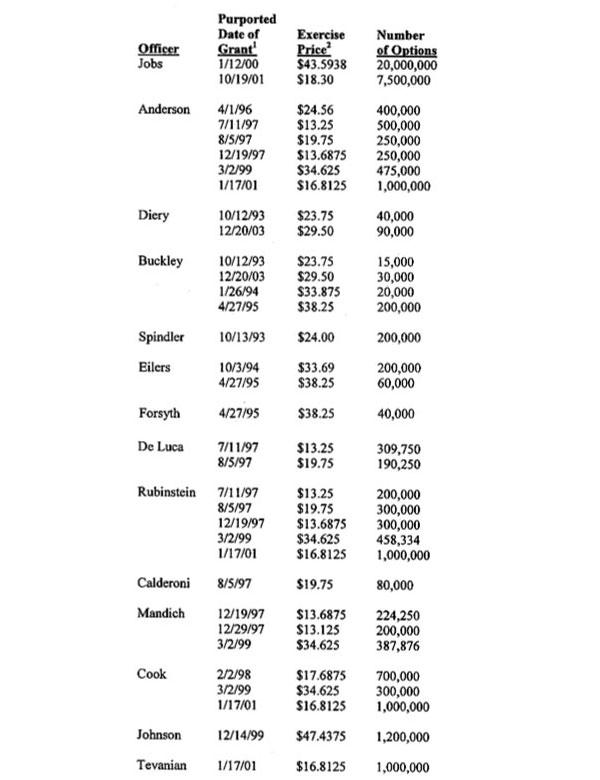
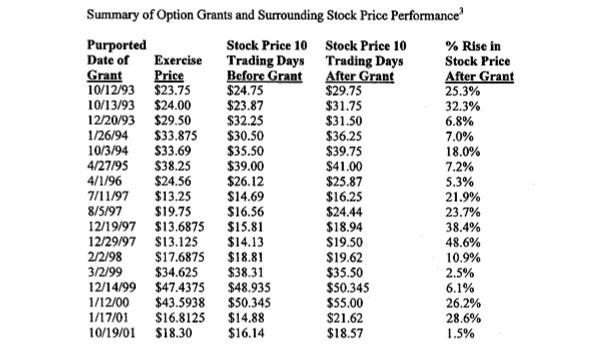
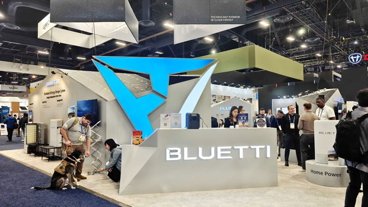

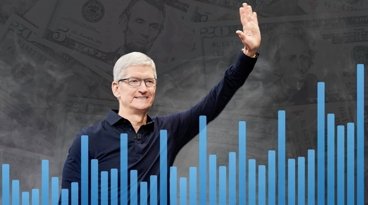




-m.jpg)






 William Gallagher
William Gallagher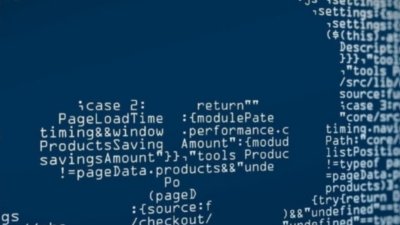
 Andrew Orr
Andrew Orr
 Christine McKee
Christine McKee

 Malcolm Owen
Malcolm Owen


 Chip Loder
Chip Loder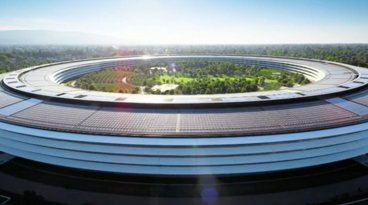









30 Comments
Holy canolis!
what is the worst case here?
if the dates are reset (to 10 days later) to unwind any fraud,
that would be a dozen million shares or so (sjobs 20M was rescinded),
with say, $5 per share edge, or $60M. this doesn't seem
material to earnings. however, is there some sort of
treble damages to SEC if this is proven?
does any recovery (whether or not there is legal indemnification
for board members) distribute evenly to shareholders?
my guess is that, as usual, lawyers profit the most.
nonetheless, since AAPL legal signs off on all this, where is
ms. nancy heinen now that we need her? oops.
A quibble with the damn lies...er...statistics:
Does that assume random choices in options pricing? It seems reasonable that after a sharp drop in stock price, a board that is confident in the future of the company could choose to award options. I'd analyze how many options were given after sharp drops, and then the stock dropped even further. And how many were not awarded after sharp drops.
I'm not saying it was all kosher, but I think the 1 in 300 billion chance might be a bit of hyperbole.
There's also the entirely separate question of whether even trying to get a low price for options is a shareholder friendly thing to do. Is that in the best interests of the owners of the company?
It certainly bears looking at further, but I don't think it's as simple as the article makes it seem (with the evidence it presents).
Nothing but more money for scum-sucking lawyers.